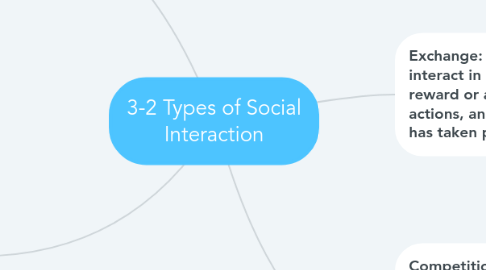3-2 Types of Social Interaction
by Shaila Biswas


1. Cooperation: Occurs when two or more people or groups work together to achieve a goal that will benefit more than one person.
1.1. Cooperation is a social process that gets things done. No group can complete its tasks or achieve its goals without cooperation from its members. Cooperation is often used along with other forms of interaction. Competition may be used along with cooperation to motivate members to work harder for the group.
2. Accommadation: Is a state of balance between cooperation and conflict.
2.1. Compromise: A compromise occurs when the two parties at odds each give up something to come to a mutual agree- ment. For example, you and a friend want to see different movies. To compro- mise, you might choose a third movie that you both would like to see.
2.2. Truce: Another form of accommodation is the truce, which temporarily brings a halt to the competition or conflict until a compromise can be reached. In wartime, the adversaries sometimes call a truce and stop fighting while a compromise, in the form of a peace treaty, is worked out.
2.3. Mediation: Sometimes, when two par- ties cannot reach a compromise through their own efforts, they will use mediation. This form of accommodation involves calling in a third party who acts as adviser and counselor to guide the two parties toward an agreement. The United Nations, for example, often acts as a mediator to resolve conflicts between member countries.
2.4. Arbitration: If mediation fails, the par- ties may use arbitration. In arbitration, a third party makes a decision that is bind- ing on both parties. Employers and labor unions sometimes use arbitration in wage disputes. When negotiation and mediation fail, they bring in an outside arbitrator to impose a settlement.
3. Exchange: Whenever people interact in an effort to receive a reward or a return for their actions, an exchange xchange has taken place.
3.1. Reciprocity: The idea that if you do something for someone, that person owes you something in return—is the basis of exchange.
3.1.1. The reward might be nonmaterial—a simple “thank you” from your parents for washing the dishes, for example. The reward could also be material, such as the wage you receive for working at a supermarket.
3.2. Exchange theory: Exchange theorists believe that people are motivated by self-interest in their interactions with other people.
3.2.1. In other words, people do things primarily for rewards. Behavior that is rewarded tends to be repeated. However, when the costs of an interaction outweigh the rewards, individuals are likely to end the relationship.

